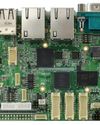Versuchen GOLD - Frei
The Post-Moore Era
Circuit Cellar
|August 2025
Could Molecular Electronics Keep the Pace?

Molecular electronics could continue semiconductor advances in a post-Moore era. Here we break down how molecular diodes, wires, and logic gates work, examine recent commercial breakthroughs, and look at the feasibility of integrating molecular components into existing semiconductor workflows. Can molecules really take us beyond the limits of lithography, or is this just another lab-bound dream?
Moore's Law is a theory that came from one of Intel's co-founders, Gordon Moore, back in 1965. He observed that the number of transistors that could be placed on an integrated circuit was doubling roughly every two years.
This theory was never meant to last forever. In fact, Moore himself predicted that it would only continue for around 10 years (up to 1975). In reality, Moore's law has continued to hold true right up into the 21st century and has been a driving force for development within the semiconductor industry, with Apple's 2025 ARM-based M3 Ultra SoC containing a staggering 184 billion transistors.
Despite this, we're now starting to see signs that we're fast approaching a post-Moore era. Silicon-based transistors can only get so small before the laws of physics start to get in the way. We're already measuring transistors on the atomic scale, with the smallest commercially available transistor measuring at 3 nanometers (only slightly wider than a strand of human DNA, which is roughly 2.5 nanometers wide). There's still some room to go smaller, and IBM recently announced their 2 nanometer chip, but progress is slow and understandably expensive. [1]
Diese Geschichte stammt aus der August 2025-Ausgabe von Circuit Cellar.
Abonnieren Sie Magzter GOLD, um auf Tausende kuratierter Premium-Geschichten und über 9.000 Zeitschriften und Zeitungen zuzugreifen.
Sie sind bereits Abonnent? Anmelden
WEITERE GESCHICHTEN VON Circuit Cellar

Circuit Cellar
The Future of Sensors in Safety Systems Sensing the Stop
How Magnetic Sensors Are Enabling the Next Generation of Braking Systems
5 mins
December 2025
Circuit Cellar
Alif Semiconductor Elevates Generative AI at the Edge with New Support for ExecuTorch Runtime in Its Ensemble MCUs
Alif Semiconductor, the leading global supplier of secure, connected, power efficient Artificial Intelligence and Machine Learning (AI/ML) microcontrollers (MCUs) and fusion processors, announced that developers can now use the ExecuTorch Runtime, a quantization extension of the popular PyTorch ML framework, for AI applications built to run on its Ensemble E4/E6/E8 series of MCUs and fusion processors.
1 min
December 2025

Circuit Cellar
Encrypted MQTT Protocol for Critical Sectors
Mechanisms, Challenges, and Best Practices
3 mins
December 2025

Circuit Cellar
Datasheet: Small Size, Big Power
Smaller Microcontrollers Bring New Possibilities
9 mins
December 2025

Circuit Cellar
Analog Devices Launches ADI Power Studio and New Web-Based Tools
Analog Devices, Inc. (ADI), a global semiconductor leader, announced the launch of ADI Power Studio, a comprehensive family of products that offers advanced modeling, component recommendations, and efficiency analysis with simulation.
1 mins
December 2025

Circuit Cellar
Compact IBR300 2.5" SBC Powered by NXP i.MX 93 from IBASE
IBASE Technology, Inc., a leading provider of rugged embedded computing platforms, announced the release of the IBR300, a 2.5\" RISC-based single board computer (SBC) powered by the NXP i.MX 93 processor with dualcore ARM Cortex-A55 (up to 1.7GHz) and a Cortex-M33 MCU.
1 min
December 2025

Circuit Cellar
Sensors in the Spotlight
The Next Decade of Embedded Sensor Systems
12 mins
December 2025

Circuit Cellar
Bob's Wrap Up
In Bob's last article with Circuit Cellar, he attempts to wrap up a career of more than 50 years as an embedded systems engineer and 14 years with Circuit Cellar. He looks at each of his 58 articles by category and provides some recommendations for his fellow engineers.
7 mins
December 2025

Circuit Cellar
Designing Embedded Software Architectures That Last
I've reviewed hundreds of firmware projects over the years, and one thing always stands out: the most successful projects have a clear, deliberate architecture.
10 mins
December 2025
Circuit Cellar
Broadcom Introduces Industry's First Wi-Fi 8 Silicon Ecosystem Powering the AI Era
Broadcom, Inc. unveiled the first Wi-Fi 8 silicon solutions for broadband wireless, targeting residential gateways, enterprise access points, and smart mobile clients.
1 mins
December 2025
Listen
Translate
Change font size
